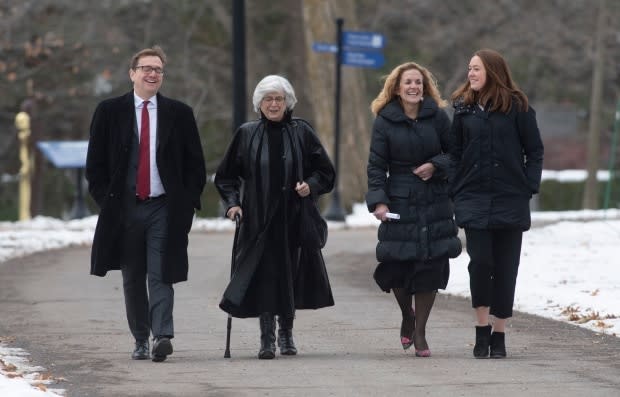Jonathan Wilkinson talks targets and transition as he takes on challenging role of environment minister
Canada's new minister of environment and climate change says he plans to focus on reducing carbon emissions in a way that also promotes economic prosperity and addresses the concerns of all regions of the country.
North Vancouver Liberal MP Jonathan Wilkinson, formerly the minister of fisheries, oceans and the Canadian Coast Guard, was sworn into his new role in Ottawa on Wednesday. He takes over the portfolio from Catherine McKenna and is tasked with pushing through a controversial pipeline project in B.C. and working with Prairie premiers opposed to the Liberal government's federal carbon tax.
"Any government must try to work to address some of the legitimate concerns and aspirations of all regions of the country, but we need to do it in the context of the bottom line that we have to achieve our targets," said Wilkinson on CBC's The Early Edition Thursday, referring to Canada's goal to get to net zero greenhouse gas emissions by 2050.
Wilkinson intends to carry through on the Liberal's plan to transition to clean energy technology and said the Trans Mountain pipeline project will help.
"We are delineating a long-term transition strategy that will get us to net zero," said Wilkinson. "The pipeline is part of that transition."
The Liberal government expects to get $500 million a year out of the expanded Trans Mountain pipeline and is promising to spend it all on cleaner sources of energy and projects that pull carbon out of the atmosphere.

Eugene Kung, a lawyer with West Coast Environment Law, said he is not surprised Wilkinson was picked for the job. He says he's hopeful that Wilkinson, along with other ministries who have a hand in the pipeline project such as natural resources and finance, will be more forthcoming with details about the Trans Mountain project, particularly when it comes to the cost of the project.
"What we should be looking for with this new cabinet is stronger climate action, and on Trans Mountain, more transparency," said Kung on The Early Edition.
Kung called Wilkinson's riding ground zero for a potential tanker spill and also noted the territories of the Squamish and Tsleil-Waututh Nation First Nations, who are challenging the pipeline in court, overlap the MP's riding.
"It is positive that the minister is familiar with this particular ecosystem and this part of the world and the sensitivities among it," said Kung.

Wilkinson, who was raised in Saskatoon, will also have the tough task of working with Saskatchewan and Alberta, where more than 60 per cent of voters chose the Conservatives, who promised to scrap the carbon tax if elected.
"I think it's a good file for him to be in to draw on both his B.C. and Saskatchewan background," said University of British Columbia political science professor Kathryn Harrison on CBC's On The Coast.
"There's a lot of work still to be done and that's going to require getting a lot of provinces on board and acting as well," said Harrison.
Canada's plan to meet its greenhouse-gas emissions targets is among the worst in the G20, according to a report released Nov. 11 by the international group Climate Transparency, which annually grades countries on their climate performance.
Canada's per-capita emissions — the greenhouse gases it releases divided by the number of people who live in the country — are the second-highest among G20 nations, behind only Australia.

